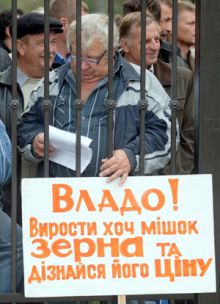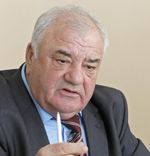This winter brought the Ukrainian farmers quite a few unpleasant surprises, with about one-third of winter crops killed by unprecedentedly severe frosts. According to the Ministry of Agrarian Policy and Food (Minahroprod) of Ukraine, a total of 1.75 million hectares – 20.8 percent of the winter plantations – will have to be resowed. The Cabinet of Ministers has promised central budget aid worth 300 million hryvnias, and that, before the end of April, it will be received by the farming businesses that have to do this kind of resowing. Minahroprod Minister Mykola Prysiazhniuk says this money will be distributed using most transparent procedures; that there will be a commission formed in every raion, tasked with the drawing up of a list of farming businesses in need of such budget appropriations, as per applications duly submitted, and then determining the ones that actually require them. According to the ministry, such commissions will include heads of the agribusiness development departments of regional state administrations, officials of state financial and agricultural inspectorates, people from land management data support centers, representatives of the Association of Farmers and Private Landowners, as well as those of the Agrarian Union. It is further stated that the Minahroprod will monitor the receipt and distribution of this budget money.
Most small- and medium-size farming businesses in Ukraine don’t want such budget appropriations; they can’t figure out how this money will be distributed this time, considering that they’ve had no access to such money on any previous occasion; that this money has been handled by all those with their noses more or less in the central budget’s trough. They made a statement to this effect during the roundtable “Hectares of Gold Reserve: Land Reform as Seen by Practitioners” held in Olhopil, a village in Chechelnyk raion, Vinnytsia oblast, organized by the local farming business, Olhopil, and Den/The Day. Hryhorii Kaletnyk, chairman of the Verkhovna Rada’s Agrarian Policy and Land Relations Committee, learned about the roundtable and said he would like to join it.
Most small- and medium-size farming businesses are scared by large landowners and hostile takeovers. They believe Ukraine’s current chernozem land shares are like a chessboard, that this pattern plays into the racket’s hand, and that the big-time landowners will destroy their small businesses and murder the Ukrainian countryside, unless the state curbs their appetite.
The price of this land reform is actually very high and it keeps on an upward curve. A rash decision may well deny Ukraine an opportunity of eventually becoming the world’s leader in the agrarian realm (considering this country’s soils and climate); that will find itself a hostage to its natural wealth. In other words, any reforms in the agrarian sector have to be carried out in a way that excludes the mistakes made back in 1990s that resulted in this country’s loss of competitive status [on the world market]. It is extremely important to hear what the practitioners in the field have to say.
COMMENTARIES
Anatolii PACHEVSKY, CEO, farming business in Kalynivka raion, Vinnytsia oblast:
“All matters pertaining to the land reform boil down to land sales. I believe this issue calls for a broader, comprehensive approach. Is it possible to work out a land turnover timeframe, while improving what has been done, correcting mistakes made at an early stage of such reforms? More than a year ago we had a meeting. It was attended by ex-President Leonid Kuchma who admitted that he had made a number of mistakes when carrying out his land reform, and that his mistakes had seriously damaged the national agrarian sector. These mistakes remain uncorrected.
“I believe the biggest mistake is the presence of chessboard-like land shares. You won’t find this absurd pattern – with 40 percent of plots being owned by urban residents as legal successors to the original owners, by people who don’t need these plots – anywhere else in the world. Imagine what will happen if they decide to sell this inheritance. This would be an ideal opportunity for all those specializing in hostile takeovers. Unless improved, this chessboard pattern will destroy the small- and medium-size farming businesses, considering that they are producers and livestock suppliers, supporting the whole social sphere of the Ukrainian countryside. Ukrainian villages will start disappearing. In fact, it is common knowledge that between 16 and 18 villages regularly vanish from a map of Ukraine, simply because large agrarian holding companies happen to be operating in the vicinity. My personal forecast is that these holding companies will fall apart in 8-10 years, after causing a great deal of damage.
“I have two land reform scenarios. Number one: the state buys the land, which is standard practice in the developed countries. Number two: the State Land Bank, meant to issue loans. No chance because there is no money, although we hear about 10-15 billion hryvnias’ worth of budget appropriations for the agrarian sector. No one sees this money. Suppose this 10-15 million is given to the State Land Bank for starters, and it is allowed to buy plots of land. Then the state could lease out such plots.”
Vasyl TARASIUK, CEO, farming business, Trostianets raion, Vinnytsia oblast:
“Who’ll have the prerogative to get a loan from the State Land Bank? If this bank buys a plot of land, who will have the right to buy it back? Answers to these questions are extremely important today. All of us remember the sad experience of government subsidies for producers. Last year, all such subsidies for livestock businesses ended up in the hands of certain individuals, leaving the small- and medium-scale farmers empty-handed.
“Another point is the one percent land tax. We don’t object, but one has to consider how many taxes one has to pay. Last year the road tax bill was passed and the cost was added to the price of diesel fuel. My farming business consumes some 400 tons of this fuel a year. In other words, we have to pay an extra 800,000 hryvnias. And now the Cabinet of Ministers wants to increase the price of land by 1.756 times.
“I’m into livestock, mostly pig-breeding. We started by 500 and now have a stock of 4,500, but I ask myself what for? Milk and meat supplies aren’t cost-effective in Ukraine. Farming businesses are sustaining losses worth millions of hryvnias. Are you trying to tell me that someone in his sound and decent mind will pay for a plot of land in the Ukrainian countryside after figuring out these statistics?”
Mykola PANASIUK, chairman, Regional Agricultural Producers’ Council, Vinnytsia oblast:
“What is being made is not a land market, just a land sales deal. None of us sitting here will buy a plot of land.
Then why sell it? We denationalized our factories before selling them.
The land has to be denationalized to once again fall into the hands of two or three individuals.”
Mykola SOROCHAN, CEO, farming business, Kodyma raion, Odesa oblast:
“I would solve the agribusiness-holding problem by making the big-time landowners hire manpower from local villages, considering the plots these companies are leasing; I wouldn’t allow them to register their property, even land lease rights, if and when over 30 percent of their personnel lived more than 30 kilometers from the village council concerned. Then our countryside would stand a chance to survive.
“Second, we all know that all these agribusiness holding companies don’t want to have anything to do with livestock-breeding or rural social sphere. They buy so many plots, then let them take proper care of these plots, without the state allowing them to pay a fixed agricultural tax; they must be denied the accumulated VAT advantage. All these advantages are due the farming businesses that operate in the villages whose lands are leased by such companies. Business interest is what rules this world. So they want to do without livestock-breeding, with manpower being brought from the 14th floor, so what? Let them do all this, but on general conditions.
“The ban on the sale of land to foreigners can be easily sidestepped by divorce proceedings.”
Yurii YALOVCHUK, CEO, farming business, Velyka Mykhailivka raion, Odesa oblast:
“This summer we’ll watch the [Euro-2012] soccer games. This project has relieved the Ukrainian budget of billions of hryvnias. So we’ll keep playing soccer for half a year, then we’ll start getting prepared for the next election campaign that will cost the central budget a small fortune. Will Ukraine be able to shoulder a third such ‘fundamental’ project? Never, because the US/UAH exchange rate will increase and the election campaign will be followed by instability. If we start selling land under such circumstances, we’ll sell it for peanuts… We want to upgrade our agrarian sector, increase the crops, have more milk. I’m slowing down this progress, not because I’m a bad manager, but because I’m afraid to take up livestock-breeding. I have this line of business, but who can guarantee that, after January 1, 2013, I will have stable working conditions? Buying sprinklers takes at least two million hryvnias’ worth of investment. I can afford this now, but what will happen after January 1?
“I happen to be a big-time landowner. Given my economic, small-profit policy, I own some 2,800 hectares with 1,000 pigs, 450 heads of cattle, and with 90 farmworkers. This doesn’t make sense, of course, but I was born in this village. This is my homeland, so I keep these people on my payroll.
“They [i.e., the domestic market] say they don’t want livestock. Your bill says at least 70 percent from the local villages must be on your payroll. Simple arithmetic shows seven persons. Then what?”
Pavlo KALENYCH, CEO, farming business in Chechelnyk raion, Vinnytsia oblast:
“Several years back I opposed the moratorium on land sales. Today I’m horrified to watch Ukraine’s land lease deals. I’m now entitled to sell my tenant’s rights without anyone else’s knowledge and consent, yet this is what stops me. The [land] reform has started and it must be carried out. The important thing is to implement it without hurting anyone’s feelings in the countryside. There is that solitary ailing owner of a plot of land. Does this person has the right to sell it?
“Doubtlessly the buyer of a given plot of land must be an individual. We must have able individual managers in the countryside, except that we have none today. They will appear tomorrow. A moratorium for such individual buyers should last for another five years, with the state buying plots of land in the meantime. Five years later, a village council will allow those who really work the land [full ownership].
Land legislation must be upgraded during these five years. For 70-80 years we had been taught to regard the kolkhoz as the best agribusiness manager, to use modern terminology. We simply aren’t prepared to buy plots and take individual risks.”
Ivan SPORYSH, CEO, farming business, village Vysoke, Tomashpil raion, Vinnytsia oblast:
“I’m the only farmer in this area who has refused all investment offers. Last year I attended a parliamentary hearing of the land reform bill. None of those who took the rostrum, none in the audience spoke for free land sales.
We have to straighten out our legislation first. Then we will lift the moratorium.
“The state must see to it that every farmer be able to sell milk, meat, grain, beetroots, and so on, at a normal price.
Everyone in the Ukrainian countryside knows of an old woman who has a monthly pension of 700 hryvnias, but is unable to sell a handful of her walnuts.
Today a kilo of walnuts sells at 20 hryvnias, compared to 60 previously. Why? Because we cannot get our walnuts across the border. This makes one laugh.”
Oleksander KOVALIV, advisor to the chairman of the Agrarian Union of Ukraine:
“To make these procedures transparent, it is necessary to put the cards on the table.
There are documents relating to every plot of land. These documents must be made public knowledge.
“We have the mechanism of this reform, but the main thing is land management. It takes a certain strategy, proceeding from the environment, regional needs, and from what the populace actually wants. We lack this strategy.
“Why is the land market bill unacceptable? Because it provides for all soils, while there is a moratorium on farmlands. In other words, we need a law on farmlands.
The third chapter of this confusing bill, dealing with farmland turnover, must be deleted.
This turnover is subject to a separate law, along with lots of other clauses. Ukraine still doesn’t have a clear-cut strategy of its land reform.”
Hennadii NOVIKOV, chairman, Agrarian Union of Ukraine:
“I’m for tough restrictions aimed at preventing a single person from owning the land. I have attended a number of sittings during which this issue was discussed. I heard long presentations about a sugar refinery being unable to adequately operate without having several thousand hectares of adjoining territory, with the local farmers not sowing the right kind and amount of sugar beet. You pay them the right price and they will give the right kind and amount, I told myself. We propose restrictions on agribusiness holding companies in terms of both land sales and lease. It is further proposed that a business entity that exceeds this quota must be forced to [make for it] and keep this quota. All who invest in this business should have prospects.
“Ten years ago, when collective farms were being destroyed, we heard that the farmer would be a solution to the problem. Banks were making big investments in that destruction process. At the time we lacked the strength to preserve what we had. Now we must take a step forward, rather than backward – as we are being persuaded to do. We may leave this issue unresolved for up to five years, but we can’t spend this time twiddling our thumbs (as is our standard practice). We must keep working to solve the problems that are in the way of the [land] reform.
“Land management guarantee is what will keep Ukraine moving forth. We’re convinced that land lease will form major business relationships in the countryside. A farmer who wants to try livestock-breeding must have at least a 15-year land lease contract.”
Hryhorii KALETNYK, MP, chairman of the VR Agrarian Policy Committee:
“We have introduced a number of restrictions into the land market bill, making it perfectly clear that only a Ukrainian national can be a land market operator. Still, a farmer as a tenant, and a farmer as the owner of a plot of land, is a legal entity. We left no loopholes because we wanted a clear-cut legal definition of the Ukrainian national, leaving no credit-line or bank-transfer options (considering that such bank transactions mostly involve foreign capital). We agreed that we would submit this bill to the Verkhovna Rada with the emphasis on the Ukrainian national as the only legitimate buyer of land, that the other possible buyers would be local authorities, entitled to purchase municipally owned plots; also, district (raion) and regional (oblast) state administrations, entitled to buy plots to meet some national and regional requirements. The third or fourth reading [in parliament] would reduce all our efforts to nil, for there would be countless amendments, with each MP adding to them, to show his creative talent. In view of the October election campaign, we anticipate an avalanche [of such amendments]. We’ll simply waste time studying them and nothing good will come out of it.
“The State Land Bank is a very good idea, on the one hand… considering that it will finance only farming businesses. On the other hand, we still can’t agree on how all those plots of land will be distributed. An attempt to expand the SLB powers in regard to the plots under its control is a big insurmountable obstacle.
“Extending the moratorium on land sales is precisely what has given rise to big-time landowners, unlawful distribution of plots, and other negative phenomena. Our land lease law has a clause to the effect that the tenant has the priority right to purchase the plot. As a result, foreigners turned a blind eye to mismanagement. They would give billions of dollars’ worth of loans, believing that the more land could be leased, the more could then be purchased. We must amend this law and delete the priority purchase right clause, because this right, if used by the state or local authorities, will allow our bureaucrats to keep their doors closed for anyone trying to carry out this land turnover.
“This land law isn’t about sales. It could be described as a ‘land constitution,’ considering that it comprises the whole complex of land issues. We took the first step in the direction of this reform back in 1992. We took the second step in 1996-99 when the land share certificates were issued, when all those shares became private property. But then the big question was whether this land should be re-privatized/nationalized, or whether a legal framework should be developed, allowing for title transfers outside Ukraine. This question remains unanswered. Resolving this issue was suspended under the previous administration when it was said ‘upstairs’ that land auctions were necessary, without determining their procedures. Four years have elapsed. Still no procedures, leaving fertile soils overgrown with weeds. We mustn’t allow this. People who work the land know how to solve this problem on a local scale, but each such effort is formally illegal. In other words, their good intentions may end up in court, if and when the local authorities lodge a formal complaint with the local public prosecutor’s office.
“It is also true that there are people who take a dim view of our bill. We’ve met with officials of such holding companies and heard what made our hair stand on end. I’d counted on our farmers’ support, but then the president of Ukraine received a letter from the Farmers’ Association, with a list of grievances against our organization. It reads that we are pressuring them, forcing them to part with one percent of their revenues, so we can help develop the rural areas.
“If we’re clever enough to regard the land market bill professionally, the VR hearings will be the biggest obstacle, considering that most MPs will address the issue proceeding from their political clannish interests, and so on. We’ll try to take into account all critical remarks, but a second reading would mean a political tug of war. Unthinkable!”


















